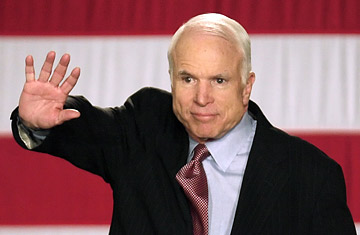
Republican presidential candidate Senator John McCain arrives at his election night rally in Dallas, Texas March 4, 2008.
Despite his superstitions, John McCain likes to describe himself as "the luckiest man you will ever meet." Most of the time, he is speaking of the past — the fire he narrowly escaped on the U.S.S. Forrestal in 1967 or the the five years of torture and confinement he survived in Hanoi. But that luck continues to this day. His victories Tuesday in Ohio, Texas, Rhode Island and Vermont sealed for him both the Republican nomination and one of the most remarkable runs in modern political history.
So it was not much of a surprise Tuesday night when McCain clarified his position on destiny before hundreds of supporters in Dallas. "I have never believed I was destined be President," he said at one point, between the cheers. "I don't believe anyone is predestined to lead America."
Still there is no denying the good fortune that has helped McCain secure the nomination. Just two months ago, the Arizona Senator was still a distant long shot, operating a bare-bones campaign on a bank loan with a dilapidated staff of mostly unpaid advisors. Then almost everything broke his way: Mike Huckabee won Iowa, crippling the powerhouse campaign of Mitt Romney. Rudy Giuliani abandoned New Hampshire, allowing his moderate supporters to shift to McCain. Fred Thompson stayed in the race until South Carolina, bleeding enough votes away from Huckabee to allow McCain to win that key state. Even Huckabee seemed to cooperate, devoting crucial days to a foolhardy effort in Michigan and swearing off any negative attacks on McCain before he bowed out of the race Tuesday night.
And luck continues to break his way for now. As McCain celebrated wrapping up the nomination, the Democratic results painted a different picture of a divided party with more fireworks expected to come. In interviews Tuesday, Republican operatives described the increasingly nasty infighting between Hillary Clinton and Barack Obama as a godsend. "Here McCain is getting another lucky break," says Scott Reed, a Republican consultant who managed Bob Dole's 1996 campaign. "What Hillary has been saying in Texas is music to our ears."
Specifically, Clinton ran an attack ad in Texas, showing a young girl sleeping and a White House phone ringing at 3 a.m., that suggested Obama is not ready to take on the job of commander-in-chief. This is exactly the message that McCain will no doubt hammer over and over again in the months to come, especially if Obama is his opponent. "All we have to do," said Reed, "is run her ad and put a tag at the end, 'Paid for by the Republican National Committee.'"
McCain's supporters also hope that the Democratic fight dampens some of the party's enthusiasm. If Clinton wins the nomination, she is now almost certain to leave a bad taste among many Obama supporters, since she will likely do it without a majority of the pledged delegates. If Obama wins, Republicans hope that Clinton's negative attacks dent his image as an inspirational figure who can transcend the politics of old. "He is not as good under pressure as he is when he has 15,000 screaming partisans around him," explained Dick Wadhams, the G.O.P. chairman in Colorado, which is expected to be a competitive state in November. "Get him away from his adoring crowds and this guy is very vulnerable."
For more than a year, Democrats have enjoyed a considerable enthusiasm advantage over Republicans by almost any measure, including turnout and fund raising. Even the percentage of Americans who identify themselves with the Republicans has fallen to 39%, according to Gallup, compared to 52% who identify with the Democrats. The McCain campaign is aware of the challenge. "We understand that we have got to get the base enthusiastic," explained Charlie Black, a lobbyist and senior advisor to the McCain campaign. But Black says he is not worried about the crowds. "Some of the biggest rallies in political history were for George McGovern," Black said of the anti-war Democratic candidate in 1972, who lost 49 states to Richard Nixon.
Black was projecting the optimism of a campaign that is riding a remarkable two-month wave of good fortune. But eight months remain between now and the election, and that is a lot of time, even for a man like McCain, who seems to attract good fortune. As McCain put it himself on Tuesday night, "Nothing, nothing, nothing is inevitable in America." He knows well that the door of chance swings both ways. Indeed, midway through his victory speech Tuesday, McCain's teleprompter failed.
